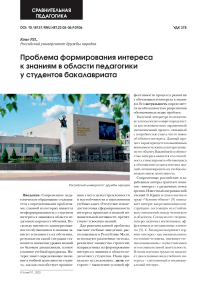Проблема формирования интереса к знаниям в области педагогики у студентов бакалавриата
Автор: Коне Рауль Порна
Журнал: Высшее образование сегодня @hetoday
Рубрика: Сравнительная педагогика
Статья в выпуске: 5-6, 2022 года.
Бесплатный доступ
Статья посвящена проблеме формирования интереса к знаниям у студентов бакалавриата. Рассмотрены понятия ситуативного и индивидуального интереса, представлена модель, направленная на формирование и развитие интереса к знаниям в области педагогики у обучающихся вузов. Показаны основные фазы развития интереса. Выделены результаты исследования, показавшие, что студенты первого курса, обучающиеся в Университете литературы и гуманитарных наук Бамако (Мали), проявляют особый интерес к получению новых знаний.
Интерес, учебный процесс вуза, знания в области педагогики, педагогическое образование, университеты мали
Короткий адрес: https://sciup.org/148324961
IDR: 148324961 | УДК: 378 | DOI: 10.18137/RNU.HET.22.05-06.P.0106
Текст научной статьи Проблема формирования интереса к знаниям в области педагогики у студентов бакалавриата
Введение. Современное педагогическое образование сталкивается с определенными проблемами, главной из которых является несформированность у студентов интереса к знаниям в области педагогики и процессу обучения. Поскольку именно от заинтересованности обучающихся в знаниях зависит успешность их обучения, результатом такой ситуации становится снижение уровня знаний по базовым дисциплинам, плохое усвоение учебной программы. Интерес имеет определяющее значение в учебной деятельности студента, так как способствует проявле- нию у него целеустремленности и настойчивости в выполнении учебных задач. Отсутствие или недостаточная сформированность интереса приводят к низкой познавательной активности, препятствуют усвоению знаний.
Для решения данной проблемы высшие учебные заведения, расположенные в Республике Мали, используют различные методы, реализуют множество стратегий, направленных на формирование интереса к знаниям в области педагогики у студентов. Нами проведено исследование, цель которого – выявление условий эф- фективности процесса развития у обучающихся интереса к знаниям. Его актуальность определяется необходимостью разрешения обозначенных выше проблем.
В научной литературе по педагогике и психологии интерес определяется как положительно окрашенный эмоциональный процесс, связанный с потребностью узнать что-то новое об объекте интереса. Данный процесс характеризуется повышенным вниманием человека к интересующему его объекту. Важнейшей особенностью интереса является его способность стимулировать обучающихся к обогащению педагогических знаний, активизировать их учебно-познавательную деятельность.
Современные российские и зарубежные авторы трактуют понятие «интерес» с различных точек зрения. Известный американский ученый Э. Крапп в своем научном труде «Человек-объект» [9] описывает интерес как реляционную конструкцию, состоящую из устойчивых отношений между человеком и объектом. Согласно его теории, интерес включает когнитивные, аффективные и ситуационные элементы [3]. С. Хиди рассматривает термин «интерес» как эмоциональное состояние человека, имеющее тесную взаимосвязь с осуществлением его познавательной деятельности. В своих научных трудах он выделяет два основных вида учебного интереса – ситуативный и индивидуальный интерес.
ПРОБЛЕМА ФОРМИРОВАНИЯ ИНТЕРЕСА К ЗНАНИЯМ В ОБЛАСТИ ПЕДАГОГИКИ У СТУДЕНТОВ БАКАЛАВРИАТА

КОНЕ РАУЛЬ ПОРНА
Российская Федерация, Москва
RAOUL P. KONE
Moscow, Russian Federation
Ситуативный интерес представляет собой аффективную реакцию учащегося (например, желание узнать больше, получить новые сведения), вызванную определенными стимулами, присутствующими в окружающей среде [8]. Индивидуальный интерес соответствует личным предпочтениям и желаниям человека, его проявление у индивида происходит путем воплощенного в намерениях и действиях стремления к желаемому и возможному удовлетворению потребностей, в том числе интеллектуальных [4].
Индивидуальный интерес является важнейшим фактором совершенствования процесса обучения студентов. Например, если обучающиеся заинтересованы в получении знаний в области педагогики, они определяют оптимальные учебные задачи, проявляют настойчивость, прилагают познавательные усилия в мобилизации эффективных стратегий обучения [12].
Процесс формирования интереса к знаниям в области педагогики у студентов связан с различными условиями объективно-субъективного характера. К субъективным условиям относятся:
-
• профессиональная установка на осуществление учебной деятельности и получение необходимых педагогических знаний;
-
• осознание учащимися того факта, что они обладают большими интеллектуальными ресурсами и способностями, которые необходимо реализовывать в учебной деятельности;
-
• постановка целей и задач, связанных с получением педагогических знаний.
Объективные условия играют не менее важную роль. Среди объективных условий формирования интереса к знаниям в области педагогики можно выделить:
-
• форму обучения;
-
• методы, используемые преподавателями для обеспечения усвоения учебной программы;
-
• взаимодействие учащихся с преподавателями и одногруппниками др. [10].
В системе формирования интереса к знаниям в области педагогики у студентов вузов особое значение придается содержанию, формам и методам обучения, которые будут эффективными если:
-
1. Содержание учебной программы будет включать информацию по пройденному и новому материалу, что необходимо для закрепления и расширения знаний студентов в области педагогики.
-
2. В учебном процессе будут широко применяться активные методы обучения (нестандартные лекции и семинары, деловые игры, тренинги и др.), что поможет повысить интерес студентов к получению знаний.
-
3. Взаимодействие обучающихся с педагогами будет построено на основе сотрудничества, что предоставит студентам возможность творчески подходить к решению теоретических и практических проблем [13].
В учебном процессе для формирования у студентов интереса к знаниям в области педагогики предлагается развивающая модель, основными задачами которой являются:
-
• вызвать первоначальный интерес у студентa;
-
• погрузить уже заинтересованных студентов в процесс освоения учебного материала;
-
• развивать познавательный интерес.
Следуя этой модели обучения можно вызвать у студентов устойчивый интерес к знаниям в области педагогики и учебной деятельности в целом. Такую стратегию можно охарактеризовать тремя ключевыми понятиями:
-
• «любопытство» – вызов интереса;
-
• «поток» – погружение и дальнейшее развитие интереса;
-
• «осмысленность» – расширение интереса.
Наиболее активно, быстрыми темпами интерес начинает развиваться, когда у студентов обнаруживается желание и стремление к получению новых профессиональных знаний. Развитие интереса к знаниям в области педагогики можно рассмотреть с точки зрения перехода от ситуативного интереса к индивидуальному. В этом случае интерес сначала вызывается, затем поддерживается, углубляется и расширяется.
С. Хиди и К.А. Реннингер выделяют четыре фазы формирования интереса:
-
1. Проявление ситуативного интереса.
-
2. Формирование устойчивого ситуативного интереса.
-
3. Возникновение индивидуального интереса.
-
4. Развитие индивидуального интереса [7].
Согласно подходу данных авторов, после проявления ситуативного интереса его необходимо поддерживать с помощью стимулов окружающей среды. Посредством регулярной поддержки ситуативного интереса в дальнейшем возникает и развивается индивидуальный интерес. Это приводит к повышению интереса студентов к образовательному процессу, в том числе к знаниям в области педагогики.
В формировании и развитии интереса у студентов особую роль играет педагог, целью которого является активное вовлечение обучающихся в учебную деятельность [1]. Однако, не у всех преподавателей получается привлечь студентов к процессу обучения, что обуславливает возникновение проблем в формировании у обучающихся интереса к знаниям в области педагогики.
Методология исследования. Для проведения исследования была выбрана группа первокурсников, обучающихся по специальности «Педагогические науки» в Университете литературы и гуманитарных наук Бамако (Республика Мали). Нами была разработана анкета, включающая 16 утверждений. 17 февраля 2022 был прове- ден опрос студентов первого курса, в котором приняло участие 45 человек: 28 мужчин и 17 женщин, в возрасте от 16 до 29 лет (см. Рисунок 1).
Обработка полученных ответов была проведена с использованием пятибалльной рейтинговой шкалы Лайкерта (см. Таблицу).
Структура анкеты включает четыре блока, каждый из которых состоит из четырех утверждений. Изучаемые факторы имеют в анкете следующие наименования:
-
1 блок – сиюминутное удовольствие;
-
2 блок – концентрация внимания;
-
3 блок – вызов;
-
4 блок – новизна.
В качестве ответов на утверждения были предложены следующие формулировки:
-
1) полностью согласен;
-
2) частично согласен;
-
3) нет мнения;
-
4) частично не согласен;
-
5) категорически не согласен.
Рейтинговая шкала Лайкерта позволила оценить уровень сформи-рованности у студентов интереса к знаниям в области педагогики.
Результаты исследования. В первом блоке анализ ответов на утверждения показал, что студенты считают материал интересным, высоко оценили учебную программу по педагогике. Полностью с соответствующими утверждениями согласилось 40 % респондентов, ча-
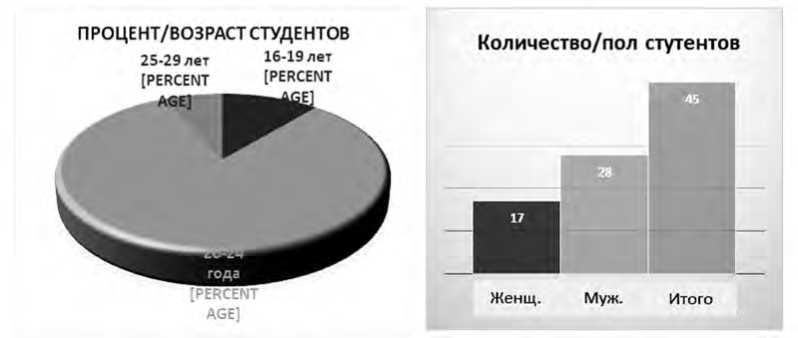
Рисунок 1. Характеристика респондентов, принимающих участие в анкетном опросе
ПРОБЛЕМА ФОРМИРОВАНИЯ ИНТЕРЕСА К ЗНАНИЯМ В ОБЛАСТИ ПЕДАГОГИКИ У СТУДЕНТОВ БАКАЛАВРИАТА
Таблица
Рейтинговая шкала интереса к педагогическим знаниям
Респондентам также был задан вопрос по поводу их активного участия в различных исследованиях. Получены следующие результаты: 42,3 % студентов ответили, что они принимают активное участие в исследовательской деятельности, 26,9 % – частично согласны с утверждением, 13,5 % никогда не принимали участие в научных исследованиях.
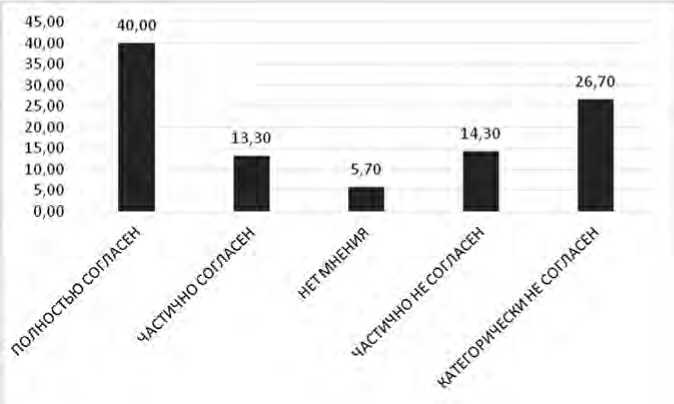
Рисунок 2. Распределение ответов по утверждению «Мне интересно пересматривать материал, который был изучен на занятии по педагогике»
На утверждение «Я прилагаю много усилий на занятиях, чтобы узнать что-то новое» 51,1 % студентов ответили «полностью согласен» и 20 % частично согласились. На утверждение «Мне интересно пересматривать материал, который был изучен на занятии по педагогике» все студенты ответили единогласно – полностью согласны, так как, по их мнению, во время этого процесса лучше усваиваются знания.
Необходимо также отметить следующее утверждение, обозна- ченное в анкете: «При изучении учебных материалов по педагогике требуется высокая концентрация внимания». Ответы студентов распределились следующим образом: полностью согласен – 57,7 %; частично согласен – 15,44 %; частично не согласен; категорически не согласен – 9,6 %. (см. Рисунок 3).
На утверждение «Задания, которые нам предлагались на разных занятиях по педагогике, были интересными» студенты ответили: полностью согласен – 46,7 %, частично согласен – 31,1 %.
По утверждениям, предложенным в блоке «вызов», студентами были выбраны варианты ответа «нет мнения». Анализ результатов опроса показал, что студенты признают необходимость получения новых знаний. В рамках соответствующего блока студентам было предложено следующее утверждение: «Мне трудно усваивать материал, который преподается в университете». Ответы студентов распределились следующим образом: полностью согласен – 11,5 %, частично согласен – 5,8 %, нет мнения – 17,3 %, частично не согласен – 26,9 % и категорически не согласен – 38,5 %. Таким образом, студенты не испытывают серьезных затруднений в изучении и усвоении учебного материала по педагогике (см. Рисунок 4).
В блоке «новизна» рассмотрим ответы респондентов, полученные на следующее утверждение: «Знания, полученные на занятиях по педагогике, мотивирует меня к осуществлению дальнейшей учебной деятельности». С данным утверждением полностью согласилось 65,4 % респондентов, частично согласны – 11,5 %, нет мнения у 1,9 %, частично не согласны – 9,6 % и категорически не согласны – 11,5 %. (см. Рисунок 5).
Результаты проведенного исследования показали, что студенты проявляют интерес к знаниям в области педагогики – большинство опрошенных согласилось с соответствующими утверждениями, предложенными в анкете.
Обсуждение результатов исследования. На основании проведенного исследования можно сказать, что постановка учебной задачи может стимулировать формирование и развитие индивидуального интереса к процессу обучения. Изучение различных аспектов интереса к учебной ситуации показало, что появление у студента интереса к знаниям в области педагогики оказывает выраженное влияние на его дальнейшую вовлеченность в учебную деятельность [6].
Результаты опроса студентов Университета литературы и гуманитарных наук Бамако позволили установить, что студенты 1 курса педагогического факультета очень заинтересованы в получении педагогических знаний. Большинство обучающихся:
-
• принимает активное участие в исследовательской деятельности;
-
• прилагает значительные усилия на занятиях, чтобы освоить новый материал;
-
• концентрирует внимание при изучении учебных материалов на педагогике.
Однако некоторые студенты не были согласны с утверждениями, предложенными в анкете, но про-
70,00
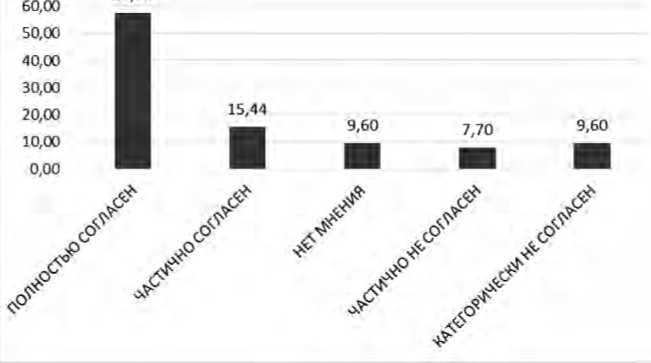
Рисунок 3. Распределение ответов по утверждению «При изучении учебных материалов на педагогике требуется высокая концентрация»
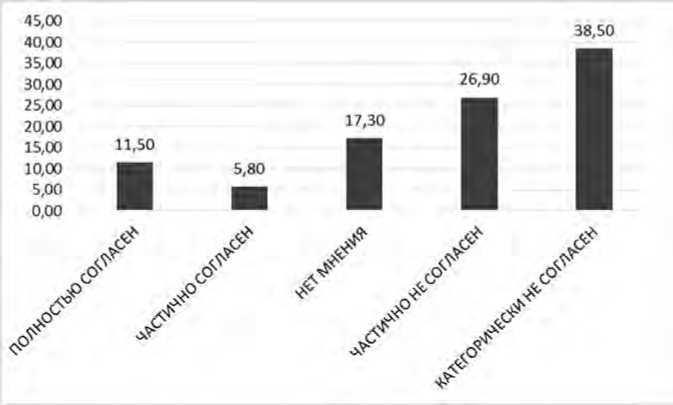
Рисунок 4. Распределение ответов по утверждению «Мне трудно усваивать материал, который преподается в университете»
70,00
60,00
50,00
40,00
30,00
20,00
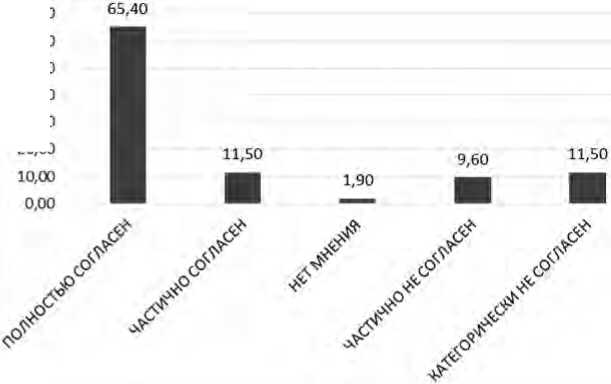
Рисунок 5. Распределение ответов по утверждению «Знания, полученные на занятиях по педагогике, мотивирует меня к осуществлению дальнейшей учебной деятельности»
ПРОБЛЕМА ФОРМИРОВАНИЯ ИНТЕРЕСА К ЗНАНИЯМ В ОБЛАСТИ ПЕДАГОГИКИ У СТУДЕНТОВ БАКАЛАВРИАТА цент таких обучающихся был значительно меньше, чем количество согласившихся студентов. В связи с этим можно сделать вывод о том, что студенты заинтересованы в получении знаний в области педагогики. Особую роль в развитии интереса играет методика обучения, которую использует преподаватель, так как именно он разраба-
тывает свою стратегию передачи студентам педагогических знаний. Хорошая стратегия преподавания привлекает внимание студентов. Вместе с этим, освоение новых знаний является достаточно сложным процессом, что подтверждают результаты проведенного анкетирования. Так, на одно из утверждений анкеты некоторые студенты отве-
тили, что с трудом усваивают новый учебный материал.
Таким образом, можно сказать, что большинство студентов Университета литературы и гуманитарных наук Бамако проявляют активный интерес к педагогическим знаниям и намерены полностью пройти учебный курс, получить диплом.
Список литературы Проблема формирования интереса к знаниям в области педагогики у студентов бакалавриата
- Chen A., Ennis C.D., Martin R., Sun H. (2006). Chapter 11: Situational interest—A curriculum component en-hancing motivation to learn. In S. N. Hogan (Ed.), New developments in learning research. P. 235–261. Hauppauge, NY: Nova Science Publishers, Inc.
- Deci E.L. Article commentary: on the nature and functions of motivation theories. Psychological Science. 1992. Vol. 3, No. 3. P. 167–171.
- Harackiewicz J.M., Smith J.L., Priniski S.J. Interest matters: The importance of promoting interest in education. Policy insights from the behavioral and brain sciences. 2016. Vol. 3, No. 2. P. 220–227.
- Hidi S. Interest and its contribution as a mental resource for learning. Review of Educational Research. 1990. Vol. 60, No. 4. P. 549–71.
- Hidi S., Anderson V. Situational interest and its impact on reading and expository writing. The role of interest in learning and development. 1992. Vol. 11. P. 213–214.
- Hidi S., Harackiewicz J.M. Motivating the academically unmotivated: A critical issue for the 21st century. Review of Educational Research. 2000. Vol. 70, No. 2. P. 151–79. DOI: 10.2307/1170660
- Hidi S., Renninger K.A. The Four-Phase Model of Interest Development. Educational Psychologist. 2006. Vol. 41, No. 2. P. 111–127. Available at: https://doi.org/10.1207/s15326985ep4102_4.
- Knogler M., Harackiewicz J.M., Gegenfurtner A., Lewalter D. How situational is situational interest? Investigating the longitudinal structure of situational interest. Contemporary Educational Psychology. 2015. Vol. 43. P. 39–50.
- Krapp A. An educational-psychological theory of interest and its relation to SDT. In E.L. Deci, R.M. Ryan (Eds.), Handbook of Self-Determination Research. P. 405–430. Rochester, NY: The University of Rochester Press, 2002.
- Renninger K.A., Wozniak R. H. Effect of interest on attentional shift, recognition, and recall in young children. Developmental Psychology. 1985. Vol. 21, No. 4. P. 624.
- Schiefele U. Topic interest, text representation, and quality of experience. Contemporary Educational Psychology. 1996. Vol. 6, No. 1. P. 3–18.
- Schiefele U., Krapp A., Winteler A. Interest as a predictor of academic achievement: A meta-analysis of research. In K.A. Renninger, S. Hidi, A. Krapp (Eds.). The role of interest in learning and development (P. 183–212). Lawrence Erlbaum Associates, Inc., 1992.
- Wade S. E., Buxton W. M., Kelly M. Using think‐alouds to examine reader‐text interest. Reading Research Quarterly. 1999. Vol. 34, No. 2. P. 194–216.

